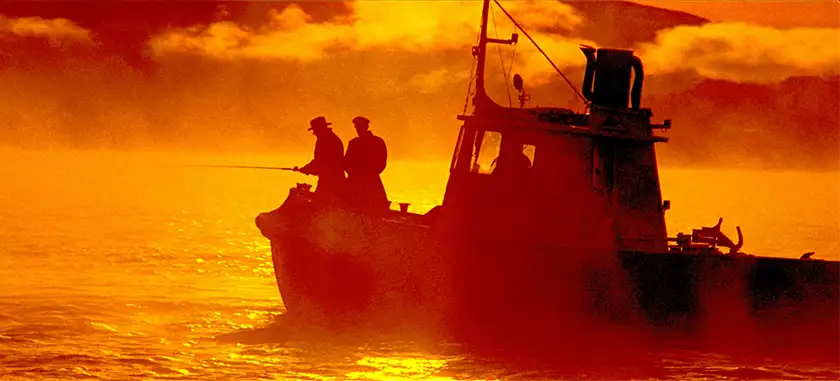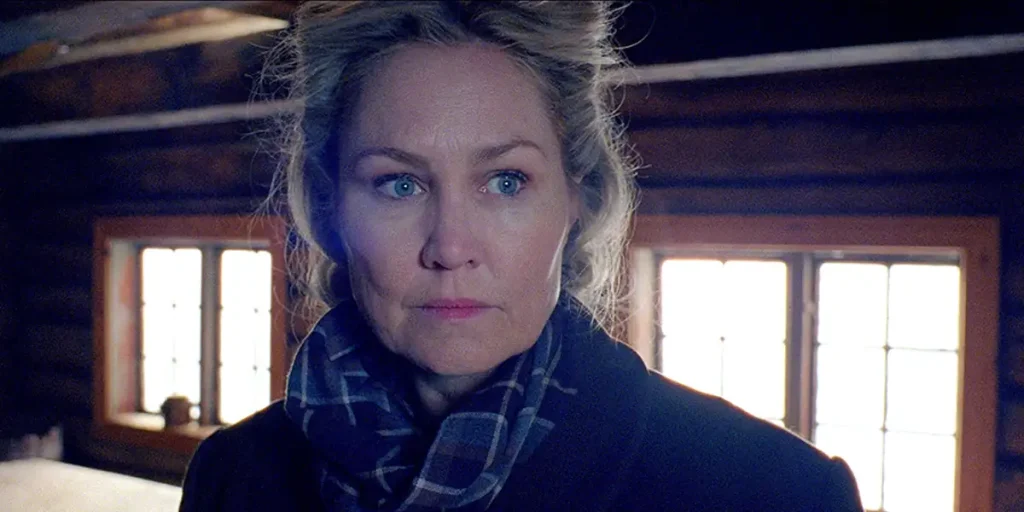For most viewers, The Fishing Place, a moving World War II drama, will likely be judged by its breaking of formal filmmaking conventions.
Director: Rob Tregenza
Genre: War drama
Run Time: 94′
U.S. Release: February 6, 2025 (NY) / March 7, 2025 (LA)
U.K. Release: TBA
Where to Watch: In select US theaters
Director Rob Tregenza was the cinematographer for Béla Tarr’s masterful Werckmeister Harmonies. That should tell viewers everything they need to know about Tregenza’s work, including his new World War II drama The Fishing Place. Like Harmonies, Tregenza’s latest is not only visually beautiful, but also formally experimental in ways that will either woo or vex its audience. Either way, The Fishing Place boldly explores religion, philosophy, and totalitarianism to haunting effect.
Tregenza relies heavily on long takes, much like he did with Harmonies. We follow a housekeeper named Anna (Ellen Dorrit Petersen) who is released from prison in order to spy on a German minister (Andreas Lust) suspected of helping a resistance against the Nazis. These shots, accompanied by an eerie score, play out almost like a theater production, with characters walking to different locations and engaging in long conversations while the camera follows. The fluid camera movement is juxtaposed with some truly marvelous static shots, including profiles of the characters and an extraordinarily lit shot of the priest standing at his church’s altar. These images help guide the story while also swinging effortlessly back and forth between realism and surrealism. The film disorients its viewers, hypnotizing them with its cinematography.
The Fishing Place prioritizes its imagery, characters, and themes over its story. The first two-thirds of the movie feels like a run-of-the-mill war drama, with a more flavorful touch because of its stellar direction. Films like this often touch on the nature of totalitarianism and the role (positive or negative) religion might play in a dictatorial state. The Fishing Place begs these types of questions in fascinating ways, reminiscent of filmmakers like Ingmar Bergman. Bergman movies also rely on their images and characters, rather than unraveling a complex plot. This film follows a similar path, which will excite fans of “slow cinema” while possibly frustrating viewers wishing for a more conventional war story.

The title itself – The Fishing Place – comes from a crucial scene in the film when the SS officer and the priest go fishing on a nearby lake. While fishing, the officer says of the fish, “maybe they’re hiding from us.” This scene, two powerful men discussing their dominance over inferior creatures, acts as the movie’s narrative and thematic centerpiece. This is one of the many examples of how Tregenza seamlessly works his deeper ideas into the film’s text.
This movie’s legacy will ultimately come down to how audiences view the third act. I dare not spoil it, but will say The Fishing Place goes from biting critique to full-fledged meta commentary on how art can communicate important ideas. This third act may immediately turn away some viewers, both because of the choice itself and how long that choice lasts (the final 20 minutes). The decision, at least in this writer’s opinion, to play with the form of this story adds to the film’s overall power. It not only asks questions about religion, power, and corruption, but it also asks us to also consider how art can or cannot articulate those ideas to their full effect.
War dramas can so easily stay inside of a box, something that The Fishing Place seems actively bent on rebelling against. Simply for that reason, Trezenga’s film is worthy of consideration and conversation. Its bold choices certainly won’t work for everyone, but it does find nuanced ways to discuss universal problems.
The Fishing Place: Movie Plot & Recap
Synopsis:
Anna is tasked by an SS officer to spy on a German priest accused of working with resistance fighters against the Nazis. Questions of morality, war, and hope arise as Anna deals with the complicated situation in which she finds herself.
Pros:
- The film is beautifully shot, featuring many long takes that allow the audience to reflect on the story’s moral and philosophical implications.
- The film’s third act twist will be divisive, but ultimately feels like a bold formal expression.
Cons:
- The film takes a “slow cinema” approach, which could easily frustrate viewers wishing for a more straightforward war drama.
- The film sometimes feels a little too abstract, with its themes struggling to reach the surface.
The Fishing Place will be released in theaters in New York City on February 6, 2025 and in Los Angeles on March 7.

